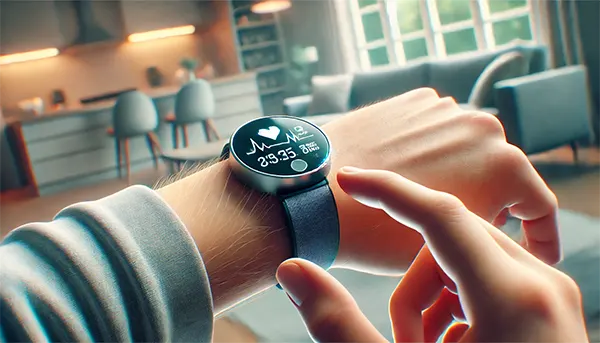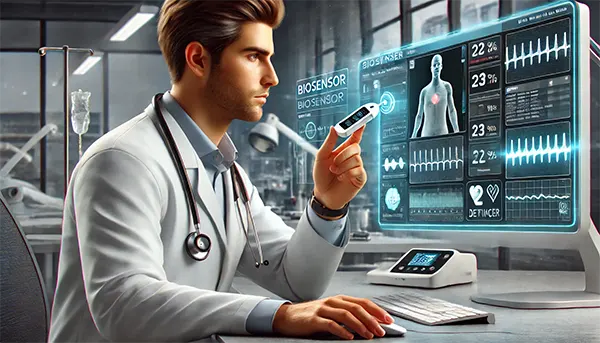Biosensors for Health Monitoring: Current Developments and Future Prospects

Biosensors are becoming increasingly vital tools for monitoring health, offering a non-invasive and real-time approach to track various physiological parameters. These devices are designed to detect biological signals and convert them into readable data, providing valuable insights into a person’s health status. As the technology continues to advance, biosensors are expected to play a significant role in preventive healthcare, diagnostics, and personalized treatment. In this article, we will explore the different types of biosensors, their applications, and the future prospects of this innovative technology in healthcare.
What Are Biosensors?
A biosensor is a device that detects biological information and converts it into an electrical signal that can be easily interpreted. Typically, these devices consist of a biological component, such as enzymes, antibodies, or cells, that interacts with a target molecule, and a transducer that converts this interaction into a measurable signal. Biosensors are used in various fields, including medicine, food safety, and environmental monitoring. By detecting changes in the biological system, biosensors can help diagnose diseases, track patient health, and provide real-time data to medical professionals.
The most common types of biosensors used in health monitoring are electrochemical, optical, and piezoelectric. Each type has unique characteristics that make them suitable for different applications. Electrochemical sensors, for example, are particularly popular in medical settings due to their sensitivity and ease of use. Optical biosensors, on the other hand, offer high precision and are often employed to monitor glucose levels in diabetic patients. Piezoelectric sensors are used to detect physical changes in biological systems and are valuable in a variety of health-related diagnostics.
Types of Biosensors Used in Health Monitoring
Biosensors come in many different forms, each designed to perform specific tasks based on the type of biological signal they detect. Electrochemical biosensors are widely used for monitoring glucose levels and other vital parameters such as blood oxygen levels. These sensors work by detecting changes in electrical charge when a molecule of interest interacts with the biological component of the sensor. Optical biosensors, which use light to detect changes in the sample, are often used in lab-based diagnostics and are particularly effective for detecting disease biomarkers.
Piezoelectric biosensors are another important type. They measure changes in mass or mechanical stress and are useful for detecting mechanical changes within biological systems. This type of biosensor is commonly used in diagnostic tools to monitor heart rate and blood pressure, as well as to detect motion or changes in lung function. These different types of biosensors offer a range of capabilities that make them essential for health monitoring and disease detection.
Applications of Biosensors in Healthcare
Biosensors have a wide range of applications in healthcare, from monitoring glucose levels in diabetic patients to detecting biomarkers for cancer. These devices enable continuous monitoring, which is crucial for patients with chronic conditions. For instance, wearable biosensors can track heart rate, body temperature, and blood oxygen levels, providing real-time feedback to healthcare providers and patients. This type of continuous health monitoring can help doctors detect early warning signs of health issues and make adjustments to treatment plans in real time.
Furthermore, biosensors play a significant role in remote patient monitoring. With wearable devices, patients can receive constant feedback on their health without needing to visit a healthcare facility. This is particularly beneficial for individuals with chronic conditions, such as heart disease or diabetes, who require constant monitoring. Wearable biosensors are also being integrated into mobile health applications, providing patients and healthcare providers with a user-friendly interface to track and manage health data.
Wearable Biosensors for Real-Time Monitoring
Wearable biosensors have become one of the most important advancements in healthcare technology. These devices, often built into everyday items like watches or fitness trackers, allow for the continuous monitoring of a variety of health parameters. For example, smartwatches equipped with biosensors can measure heart rate, track physical activity, and even monitor sleep patterns. The data collected from these devices can help individuals maintain a healthy lifestyle and detect potential health risks before they become serious.
Wearable biosensors are also beneficial for individuals recovering from surgery or undergoing rehabilitation. By tracking movement, heart rate, and other vital signs, healthcare providers can closely monitor the patient’s progress and adjust rehabilitation plans accordingly. The ability to monitor patients remotely using wearable devices helps prevent complications and reduces the need for frequent hospital visits, making healthcare more accessible and affordable.

Future Prospects and Challenges
The future of biosensors looks promising, with advancements in nanotechnology, artificial intelligence (AI), and miniaturization paving the way for even more sophisticated devices. These technologies have the potential to make biosensors more accurate, reliable, and affordable. For instance, the integration of AI with biosensors will allow for more precise data analysis, improving the diagnostic process and enhancing the effectiveness of personalized treatments. In the future, we may see biosensors capable of detecting multiple biomarkers simultaneously, offering a more comprehensive view of a person’s health.
Moreover, the development of flexible and biodegradable biosensors will make these devices more comfortable to wear and less harmful to the environment. These innovations could further increase the adoption of biosensors in healthcare by reducing costs and improving patient comfort. However, challenges remain in terms of regulatory approval, data privacy, and the durability of the devices. Despite these hurdles, the potential for biosensors to revolutionize healthcare remains enormous, offering new ways to monitor and treat a wide range of health conditions.
Advancements in Sensor Technology
One of the most exciting advancements in biosensor technology is the integration of AI and machine learning. These technologies will allow biosensors to analyze data in real time, making it easier for healthcare providers to make quick decisions based on the information received. Additionally, AI can improve the accuracy of diagnoses by recognizing patterns in the data that may be too subtle for humans to detect. As AI continues to improve, it will enhance the ability of biosensors to predict health outcomes and personalize treatment plans.
In addition to AI, researchers are also exploring the use of nanotechnology to further improve biosensors. Nanomaterials can enhance the sensitivity of sensors, enabling them to detect smaller changes in biological systems. The development of flexible and stretchable biosensors, which can conform to the skin, promises to make wearable health-monitoring devices even more comfortable and user-friendly. These advancements are paving the way for the next generation of biosensors that will play a vital role in shaping the future of healthcare.
